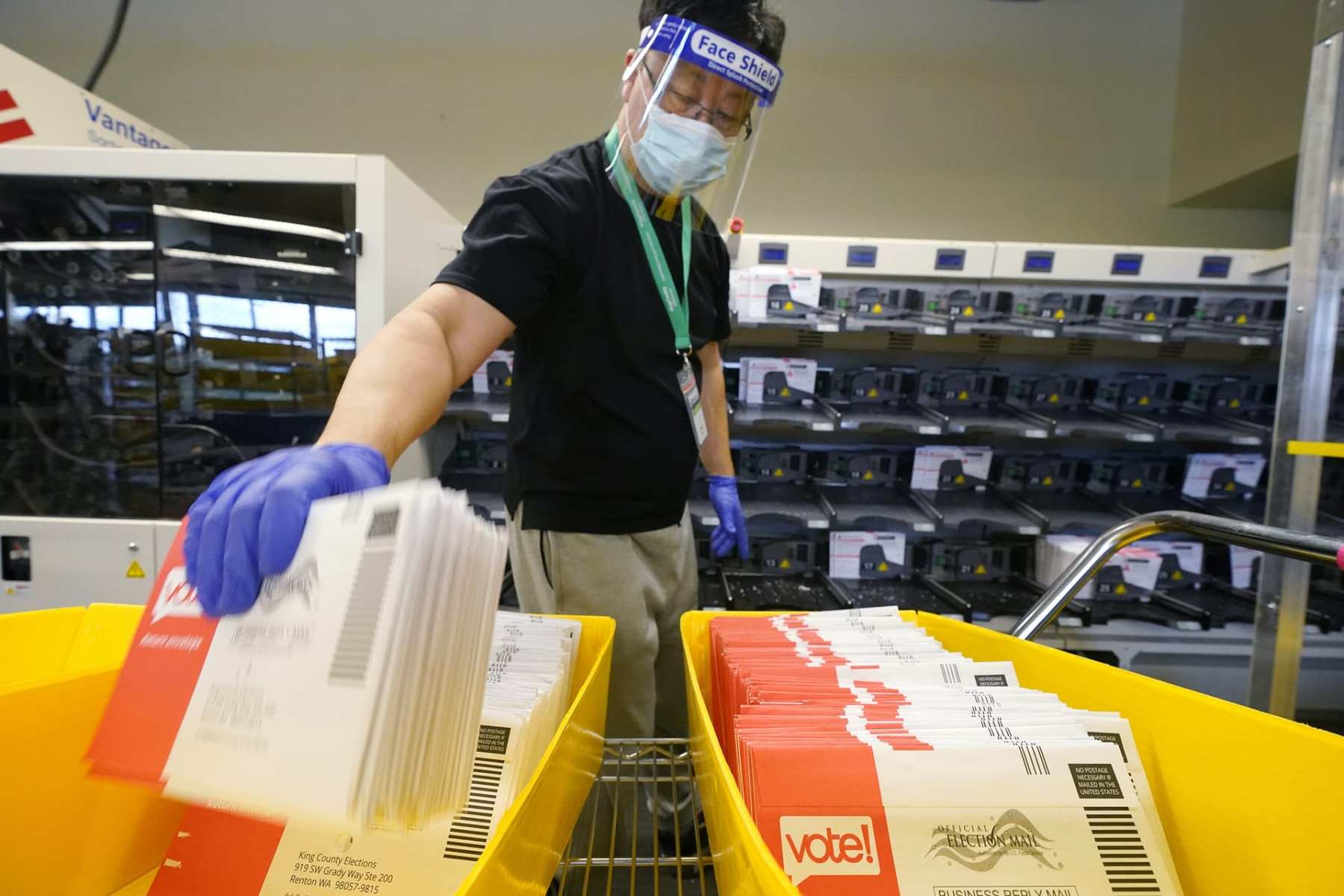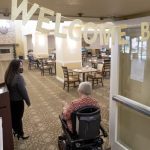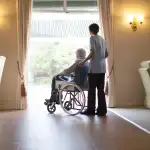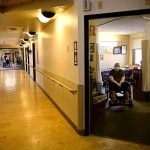We’re going to get you through this election. Sign up for our daily newsletter.
Penny Shaw said her shoulder muscles wouldn’t allow her to reach up to access a ballot drop box. So the 77-year-old opted to ride her power chair to the post office, six blocks from her Massachusetts nursing home, to drop off her absentee ballot.
“I’ve managed to vote in every state and national election, except when I was on life support,” said Shaw, who has lived at the nursing home for nearly 19 years.
Shaw lives in a small town with a population of about 35,000. Everything she needs, from the town hall to the post office, is within eight blocks of her nursing home. Because of the pandemic, the town reduced the number of polling places by half, but luckily she was still close enough to mail her ballot, she said.
“I decided to get out of my building to vote, but other people can’t,” Shaw said.
Of the 1.3 million nursing home residents in the United States, about half a million have no or mild cognitive impairment and are more likely to vote, according to Nina Kohn, a law professor at Syracuse University and a scholar in elder law at Yale Law School. But nursing home advocates and experts are concerned that thousands upon thousands of nursing home residents may not be able to vote due to increased restrictions under the pandemic, understaffing and the spread of misinformation.
More than two-thirds of the nursing home population are women and about 90 percent of nursing home aides are women. Around 84,000 COVID-19 deaths in the United States have been reported among residents and employees of nursing homes and other long-term care facilities, according to a New York Times database. This figure accounts for nearly 40 percent of the country’s coronavirus deaths, emphasizing how fatal this disease is for older Americans with underlying health conditions.
At the same time, older Americans are the most politically engaged demographic in the country. In 2018, more than 65 percent of women older than 65 voted, compared with just 38 percent those between 18 and 29 years old.
Kohn said nursing homes are required to help residents access the ballot — even during a pandemic.
“Facilities have an obligation under federal law to assist residents who wish to vote, but short staffing and other challenges we’re seeing amid COVID-19 lead to concern that this support may not ensure that residents can, in fact, vote,” Kohn said.
But when it comes to oversight, many surveyors — who conduct annual inspections of every Medicare and Medicaid-certified nursing home in the country — fail to investigate disenfranchisement on a systemic level, Kohn said. Most citations are the result of resident complaints, which makes it hard to track how many residents are actually being denied the right to vote.
These long-term care facilities face extra challenges this year.
“We don’t really know what’s going on in nursing homes right now,” Kohn said. “Ombudsmen, who are the eyes and ears of the public for nursing home residents, by and large aren’t going into these facilities. We have a terrible problem of invisible suffering in these facilities.”
We have a terrible problem of invisible suffering in these facilities.
Nina Kohn, law professor at Syracuse University
On October 5, the Centers for Medicare and Medicaid Services — the government agency that administers the nation’s major health care programs — issued a memo reminding nursing home facilities that they were required to uphold residents’ right to vote despite COVID-19.
“Nursing homes should have a plan to ensure residents can exercise their right to vote, whether in-person, by mail, absentee or other authorized process,” according to the memo.
Many families and friends that may have once helped nursing home residents in the past might be banned from coming into the facilities due to public health concerns. The Centers for Disease Control and Prevention also recommended relocating polling locations from nursing homes, long-term care facilities and senior living residences, or places where at-risk people live.
Alexa Schoeman, a deputy state ombudsman in Texas, said all in-person visits to nursing homes were restricted in March. But ombudsmen in the state slowly started to resume facility visits at the end of August and helped facilities plan for the 2020 election.
Schoeman is a part of the Long-Term Care Ombudsman Program, which is authorized by the Older Americans Act and operates in all 50 states to ensure that nursing home residents have someone to advocate for them, address their complaints and educate them about their rights.
“It’s always important to remember that just because someone is moving into a nursing home doesn’t mean that their right to vote is taken away,” Schoeman said.
Robyn Grant, the director of public policy and advocacy at the National Consumer Voice for Quality Long-Term Care, an advocacy group, said she was “extremely concerned” because without outside community help, many residents are forced to rely entirely on their nursing homes to vote, she said.
“In some states, there are prohibitions on staff helping residents,” Grant said. “I think that adds another layer of complexity to this.”
For example, a 2013 law in North Carolina prohibits nursing home employees from “providing assistance with absentee voting.”
In addition, Grant said there is not enough staffing to meet resident needs. There was already a shortage before the pandemic, but now, even more staff members are out sick, required to self isolate in their homes or afraid to go to work because they don’t want to risk the health of their families.
False claims and misinformation being spread about mail-in voting — often from the President Donald Trump — also poses a special risk to nursing home residents, many of whom are unable to physically go to the polls. Mail-in voting has worked successfully before the pandemic, and many experts agree it is safe and reliable. Suggesting otherwise threatens to disenfranchise older adults, particularly those with disabilities and those living in institutions, Kohn said.
“Mail-in voting makes it possible for many people to vote who otherwise wouldn’t,” Kohn said. “It helps ensure that we don’t impose unnecessary cost on certain populations. And when you cast false assertions on the validity of this process, it really affects older adults.”
The disenfranchisement of the nursing home population, which accounts for about 4.5 percent of all older adults, could have a real impact.
“At a national level, it doesn’t seem like it would have a major impact, but I certainly think there is the possibility when you look at state and local levels,” Grant said. “If you take an area where there is a large population of older adults, I think at that point it could impact the outcome of a close race.”







